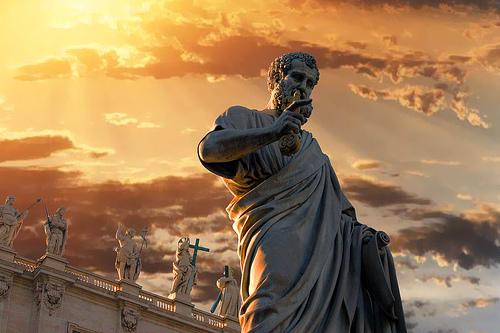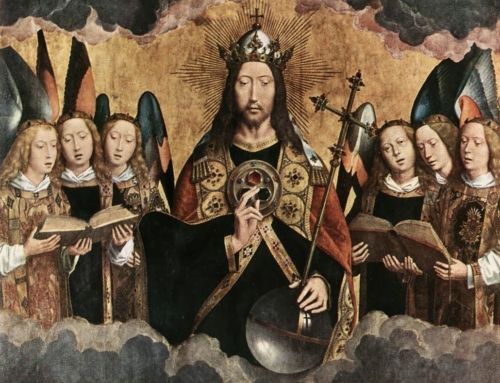I encourage you to listen to my church history podcast Triumphs and Tragedies. I’m not a historian by any stretch, and I’m afraid the podcast is more than rough around the edges. It was simply my attempt to give a quick roller coaster ride through twenty centuries of church history so that we can make better sense of where we are by understanding where we’ve come from.
One of the things you’ll gather is not only the history of the Catholic Church, but through that lens, a good overview of European history from the Roman Empire to the present day. The Catholic Church is the only institution from that time period that still not only survives, but thrives. Think about it!
The series is available on my blog and at BreadBox Media, PlayerFM and my iTunes channel. It’s not perfect and I’d do a lot differently if I were doing it again, but its a worthy effort. Give it a try!
One of the interesting things that has come out of my research for the series is a 500 year pattern. I know we tend to impose patterns on things where they may not exist, but think about this pattern within church history.
The first five hundred years is the Roman period. The church grows, goes through persecution, then is established and the fortunes of the church rise as the Roman Empire slowly crumbles.
The second 500 years are the Dark Ages. Europe drifts into chaos, anarchy and lawlessness. The barbarian tribes invade, but St Benedict establishes monasticism in the East while the Celtic church is flourishing and sending out missionaries from the West. The hierarchy and papacy disintegrates into an ongoing war between what are essentially Italian crime families.
The third 500 years sees the great flourishing of Christendom. Monasticism blossoms, learning expands, universities are established, art and architecture flowers into greatness. The Middle Ages enjoy a unity across Europe united in loyalty to a papacy that is growing in power, organization and domination of European civilization.
The fourth 500 years are are time of revolution. First the Protestant revolution, then the dissent and division of nation states, the English Protestant revolution, the French revolution, the revolution of rationalism, secularism and humanism and the American revolution. Then the industrial revolution, Russian revolution, Spanish, Mexican and Italian revolutions. Two world wars and finally the sexual revolution and technological revolution. These 500 years have been tumultuous, and they have sent the church reeling.
These last 500 years have seen the church struggling to cope with the revolutions of the modern world in a multitude of different ways, and the church’s reaction to Protestantism, rationalism, secularism, liberalism, modernism and all the other “ism’s” has sometimes been to pull up the drawbridge, man the battlements and attack from a position of defense. The other approach has been the attempt to baptize what is good about the new ideas and embrace them as new insights into the wholeness of God’s truth.
That struggle–both to withdraw and defend and the attempt to embrace and baptize the new insights–has been a long, hard, beautiful struggle.
But where are we now?
I believe we are at the end of a 500 year cycle and about to enter a New Age in the church. This means great uncertainty. Some respond by a blind attempt to return to an earlier age–preserving all the externals of a bygone Catholic age. Other respond in exactly the opposite way–by embracing everything new and adapting the church completely to the Spirit of the Age.
I believe the true answer is a balance of both approaches. Firstly, there must be a return not just to a form of Catholicism from some arbitrarily selected golden age, but a return to the core message and values of the gospel itself. Put simply, the heart of the new age must be a return to the old, old story of God’s love for a fallen and wayward race, the surprise of his entrance into this world through the incarnation of his Son, and the redemption of the world through the blood of Christ. This story is forever old, but it is never out of date. It is the story of Jesus Christ who is the same, yesterday, today and forever. This must remain the core of our message and life. The rest is window dressing.
At the same time we should be prepared for a church in the twenty first century which is young, alive and Southern. I don’t mean by that the Southern United States, but the Southern hemisphere. John Allen’s book The Future Church presents ten trends of the future–a church in which many of our current concerns simply disappear as the young church of Africa, Asia and South America surges forth. This new 500 year cycle will see a truly global Catholic Church–one that has its roots in Europe and Rome, but which is now surging strongly in China, India, Africa and around the world.
If my predictions are accurate–and every trend suggests they are–then the Catholic Church is on the cusp of huge changes which will not be brought about by some sort of reform movement or some manipulated synod about this or that. The changes will sweep away both the tired old liberalism of the West as well as the hide bound traditionalist response.
In other words, the next 500 years will be exciting because God does not forsake his church, and while Jesus Christ is the same yesterday, today and forever, he is also the one who makes all things new.







The first shall be last and the last shall be first, the Africans last among mankind in terms of Wealth passing by their European Brethern. Interesting that if the Anglican Church is it is to remain relevant it has to accept it’s African Congregations and their stance on women bishops, gay inclusiveness, the Bible. No, better that the Flamboyantly attired Female Bishops lead their tiny flocks up the paths to the hills to avoid any acceptance of traditional values. Sadly, there are Catholic Bishops who would do the same.
Laurence, you state, “if the Anglican Church is to remain relevant …” Hasn’t Anglicanism/Episcopalianism been irrelevant for a while?
Blessings,
L.
It is good to know, in general, the failures and successes in various eras, and using 500 years for eras seems good, especially the most recent 500 years of religion and politics (God and Man).
To me, the essential questions in all eras including the current/next 500 years remain the same:
1. Where did we come from?
2. Why are we here?
3. Where are we going?
4 What are the best principles we should build our lives on?
The one word answer: GOD.
Two words: Jesus Christ.
Christ said go and teach all nations. If they accept you, stay awhile, If not, leave. Today we have some 7 billion people in the world. So many to be taught, so few good teachers.
The Roman Catholic Church has the responsibility to teach all nations. Some will listen. Others will not. Still we teach as best we can. Teaching is one thing. Learning – a change in behavior – is something else. Learning requires the consistent good use of Free Will regardless of income or social status.
We live in an era of cacophony of ideas and behavior. It is hard for many to see this cacophonic world and choose to accept the Teachings of Christ enough to allow for an improvement in our behavior. Many just want to fit in with the prevailing ideas and behaviors of their culture or sub-culture. So the idea of taking time to quietly read and listen, to reflect on the Teachings of Christ, to allow the quiet voice of the Holy Spirit to reach us seems so foreign that many see no point in trying to learn. They tune out. And so, to be forced into learning about Christ seems to be an attack on their personal Free Will.
Well that second 500 years also ended with a great tragedy. The unfortunate divorce of Western Christianity from her Eastern brothers and sisters.
What makes the Catholic Church so credible is that it is always right. Abortion is wrong, divorce is wrong, same sex marriage is wrong, cohabitation is wrong, artificial contraception is wrong, etc. Even with all of our corrupt (and criminal) clergy, the timeless stance on these issues has not changed.
What will drive the church in the future is not adapting the church to modern times by suddenly accepting all of these bad things, but people eventually realizing the truth in all of these things and recognizing that man could not possibly sustain this truth through the ages without God. This realization will only dawn on a small group of people who are willing to think and listen. That’s getting to be a much smaller group these days.
The Doctrine of the Catholic Church is protected by the Holy Spirit. Not even the worst pope in history could change it. This simple realization is what keeps me Catholic: Christ has not and will not abandon us.